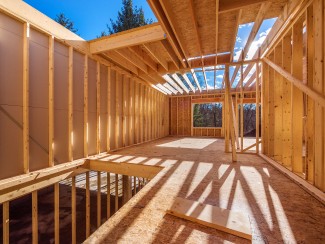The American Council for an Energy-Efficient Economy (ACEEE) will lead a coalition to help leading states adopt progressively stronger residential energy codes, culminating in new homes with zero greenhouse gas emissions and far lower utility bills. The Department of Energy today announced it selected ACEEE and a team of partners for an award of $3.6 million to work with states representing more than a quarter of the U.S. population to develop and adopt amendments to strengthen existing model building energy codes.
The coalition will be initiated with six leading states—California, Colorado, Maryland, Massachusetts, New York, and Washington—and will develop a series of three amendment packages that can be used to modify model codes used by many states across the country. The amendments are planned to lead to three sets of progressively stronger building codes that will significantly lower utility bills for residents and eventually achieve zero-emissions new homes:
- Zero-ready codes: high efficiency and prepared for future upgrades to make the home zero-energy and zero-emissions,
- Near-zero codes: so efficient that most of the home’s energy use comes from renewable sources, and, finally,
- Zero-energy and zero-emissions codes: a home so efficient that on-site renewable energy provides all of its energy usage over the course of a year.
“States and localities need a clear roadmap to achieve zero-energy and zero-emission building codes over the next decade,” said Steven Nadel, ACEEE’s executive director. “We’re excited to lead a coalition to help states and cities implement codes that combine robust energy efficiency with renewable energy supply to put us on the pathway to eliminating greenhouse gas emissions from new homes.”
Partnering with ACEEE and the six states in the coalition are Enterprise Community Partners, the National Association of State Energy Officials, and the New Buildings Institute. The coalition will develop supporting materials and analyses for the three code packages, including an assessment of job skill and training needs. The coalition will prioritize affordable housing and ensure extensive engagement with community-based groups and labor. As the new coalition helps states advance cutting-edge residential building codes, the ACEEE-led National Energy Codes Collaborative is supporting states and jurisdictions in implementing updated codes, creating a critical ecosystem to cut emissions from new homes while reducing energy bills.
In addition to the six participating states, the coalition will seek to work with 12 more jurisdictions and provide technical assistance so they can adopt and implement the code amendments. Residential building codes apply to single-family homes and apartment buildings that are three or fewer stories.
The states and nonprofit groups participating in the coalition welcomed the news with the following statements:
California Energy Commissioner Andrew McAllister said: “State building codes are an essential tool for reaching our collective zero-emissions goals, yet most states do not have resources to create bespoke energy codes. DOE resources will support key collaboration across states and with trusted partners to develop the advanced codes that will accelerate progress and build markets for clean technologies.”
Colorado Energy Office Senior Program Manager Adam Berry said: “The Colorado Energy Office is thrilled to be a partner, along with several other leading states, on ACEEE’s application for net-zero-energy model code development selected for an award by the Department of Energy's Resilient and Efficient Codes Program. Colorado recognizes the imperative of eliminating emissions from our buildings, and the opportunity that advanced energy codes present in achieving that goal. We look forward to working with ACEEE and our fellow partner states to develop model energy codes that will help our states, and state and local governments across the country, drive toward a zero-emission future.”
Massachusetts Department of Energy Resources Commissioner Elizabeth Mahony said: “Robust, clear building codes are the cornerstone for decarbonizing buildings, reducing energy costs and creating climate-ready housing. We’re excited to collaborate with the coalition cities and states on model code language that will help increase the efficient adoption of best practices for green building.”
New York State Energy Research and Development Authority (NYSERDA) President and CEO Doreen M. Harris said: “On behalf of New York State, NYSERDA is proud to work with the American Council for an Energy-Efficient Economy and other coalition partners to lead the adoption of nation-leading residential building codes utilizing this important federal funding. Prioritizing sustainability and affordability in these code updates will not only serve as a model for other states across the country to follow but means more consumers can experience the benefits of energy-efficient, zero-emission living spaces powered by clean energy.”
Washington State Department of Commerce Assistant Director for the Energy Division Michael Furze said: “Washington has always been on the forefront of advancing state energy codes, and we are thrilled to partner with other leading states and ACEEE to bring innovative codes one step further. This work will ensure new buildings are highly energy efficient, decarbonized, and low cost to operate and live in.”
Enterprise Community Partners Senior Program Director Michelle Diller said: “Enterprise Community Partners is proud to be part of this coalition and is committed to equipping affordable housing leaders with a clear path to zero-energy, zero-emissions homes. Together, we can create healthy, energy-efficient housing that reduces costs for both owners and residents.”
National Association of State Energy Officials President David Terry said: “NASEO looks forward to working with the participating states and our partners to develop and implement more modern, innovative building energy codes that meet participating states’ policy goals of reducing energy costs for homeowners and businesses, while helping to meet their resilience and emissions reduction goals.”
New Buildings Institute Associate Director Ben Rabe said: “NBI is thrilled to work with ACEEE and other partners to help states make the leap to net-zero codes. Leaning into NBI’s deep energy code experience, we look forward to drafting the code measures that make a net-zero code possible.”


